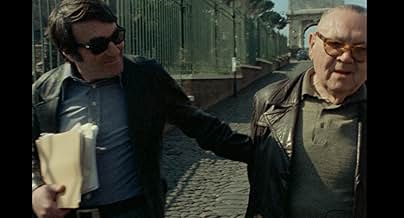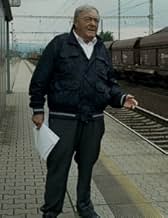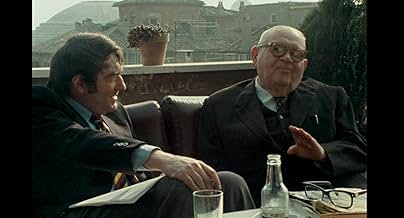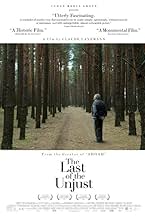Füge eine Handlung in deiner Sprache hinzuA place: Theresienstadt. A unique place of propaganda which Adolf Eichmann called the "model ghetto", designed to mislead the world and Jewish people regarding its real nature, to be the las... Alles lesenA place: Theresienstadt. A unique place of propaganda which Adolf Eichmann called the "model ghetto", designed to mislead the world and Jewish people regarding its real nature, to be the last step before the gas chamber. A man: Benjamin Murmelstein, last president of the Theresie... Alles lesenA place: Theresienstadt. A unique place of propaganda which Adolf Eichmann called the "model ghetto", designed to mislead the world and Jewish people regarding its real nature, to be the last step before the gas chamber. A man: Benjamin Murmelstein, last president of the Theresienstadt Jewish Council, a fallen hero condemned to exile, who was forced to negotiate day a... Alles lesen
- Regie
- Drehbuch
- Hauptbesetzung
- Auszeichnungen
- 3 Nominierungen insgesamt
Handlung
WUSSTEST DU SCHON:
- WissenswertesThe editing took two years.
- VerbindungenReferences Theresienstadt (1945)
Lanzmann had excluded Murmelstein's voice from Shoah not because he didn't find the man's story fascinating, but because he had such profoundly mixed feelings about him that he could not fit him into a larger historical cartography of the Final Solution. The Last of the Unjust begins with Lanzmann, now in his nineties, informing us that the figure of Murmelstein had haunted him for the last three decades, and that he felt he had an obligation to bring his story to screen, for the atrocities of the age could not be adequately understood without understanding Murmelstein.
The film starts a bit slowly. One is not clear for a long while why Murmelstein's story seems so singular. This is not to say that the film is ever uninteresting. Murmelstein fiercely refutes, and indeed mocks, Hannah Arendt's characterization of Adolf Eichmann as "banal". The Eichmann described by Murmelstein is a subtly monstrous man, capable of cloaking the most inhuman threats of violence through a cultured choice of words. Eichmann seemed to like Murmelstein because he was one of the few people perceptive enough to understand just how much Eichmann enjoyed the suffering he caused. Arendt's account is, for Murmelstein, a foppish depiction that has done history the disservice of absolving a devil.
As in Shoah, Lanzmann demonstrates a great instinct for landscapes, noticing the beauty of the settings for some of the twentieth century's greatest atrocities. Here, though, these perceptions seem touched by a bit of sloppy sentimentality, perhaps a result of the auteur's age.
One of the most memorable aspects of Shoah is how it documents the incredible lengths the Nazis went to obscure their crimes even as everyone living under their power seemed to know about them. Theresienstadt, the ghetto under Murmelstein's charge, was designed as another attempt to deceive the world about the Nazis' actions towards the Jews. Propaganda films were made showing Theresienstadt's residents dancing and singing. The Nazi's thus tried to present their attitude towards targeted minorities as "separate but equal". In reality, however, Theresienstadt was little better than a death-camp itself in which many people starved or were worked to death. In a telling example of Murmelstein's rapport with his Nazi captors, they ask him what he thinks of their propaganda film about the ghetto. He responds, "I understand why you don't show the corpses filling the attics, but don't you think having everyone smiling and singing is laying it on a bit thick?"
The full complexity of Murmelstein's role in history isn't really revealed until the film's extraordinary last hour. Although himself imprisoned, Murmelstein gradually attained absolute control over the day to day life of the ghetto, determining who could eat what and how long and in what way each "resident" would work. Feeling he had to keep the ghetto productive if it was not to be destroyed, Murmelstein adopted a brutal regimen of labor and scarcity under which not a few of his subjects died or went insane. The survivors, however, were amongst the very few Jews to escape the death camps when liberation came. (Murmelstein, appropriately it seemed to me at the time, laughs off a question posed by Lanzmann about whether he was trying to save those under his control or merely himself. The two were interconnected, explains Murmelstein, and one who has not faced such ethical choices are not fit to ask where survival instinct ends and ethics begins.)
The question, of course, is whether Murmelstein was more of a Jewish savior or a Nazi collaborator. The answer, or course, is that he was both- an individual thrust into an ethical situation so impossible that not only were there no blacks or whites, but barely any perceptible grey areas. As I watched the film, I found myself taken in by Murmelstein's perspective, as I sensed Lanzmann was as he interviewed him. In the film's final shot, Lanzmann embraces Murmelstein with convincing warmth. This made sense to me, as well, knowing Lanzmann's Zionist politics and the accompanying conviction that the "super-oppression" that has, from a Zionist perspective, characterized the history of the Jewish people justifies offensive violence by the Jews in the name of survival. Murmelstein, the film seems to be suggesting, is the embodiment of the "Jewish condition".
OR IS IT?
Lanzmann tells us at the beginning that he had felt irresponsible for thirty years for not telling Murmelstein's story. Prior to the film's last hour, consisting almost exclusively of interview footage taken in the early 1980s, the old Lanzmann relates to us in recently taken footage how the first two rabbis of Theresienstadt had destroyed themselves because of the ethical impossibility of the situation into which the Nazis had thrust them. The full horrors of Theresienstadt, never fully discussed by Murmelstein, are revealed. If Lanzmann had, thirty years prior, been persuaded by Murmelstein of the necessity of his actions, is this new film a kind of confession on the part of the filmmaker that he embraced a man who had become part and parcel of the Nazi machinery of death? If so, does this reveal a reconsideration on the part of the old Lanzmann about the role of Zionist violence? If so, Lanzmann will never admit to it, but I wonder.
- treywillwest
- 4. Okt. 2017
- Permalink
Top-Auswahl
Details
- Erscheinungsdatum
- Herkunftsländer
- Sprachen
- Auch bekannt als
- The Last of the Unjust
- Drehorte
- Produktionsfirmen
- Weitere beteiligte Unternehmen bei IMDbPro anzeigen
Box Office
- Budget
- 2.500.000 € (geschätzt)
- Bruttoertrag in den USA und Kanada
- 40.563 $
- Eröffnungswochenende in den USA und in Kanada
- 14.328 $
- 9. Feb. 2014
- Weltweiter Bruttoertrag
- 63.136 $
- Laufzeit3 Stunden 40 Minuten
- Farbe
- Sound-Mix
- Seitenverhältnis
- 1.85 : 1
Zu dieser Seite beitragen


![Bande-annonce [OV] ansehen](https://m.media-amazon.com/images/M/MV5BODkxYzJlMTQtNTdjYy00OTc0LWFkZjctNmZmMGE2MTRkZjQ4XkEyXkFqcGdeQXRyYW5zY29kZS13b3JrZmxvdw@@._V1_QL75_UX500_CR0)





















